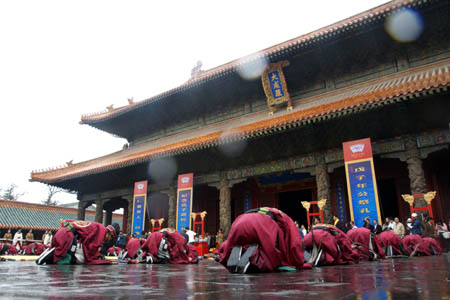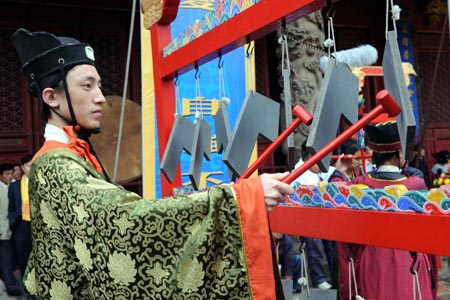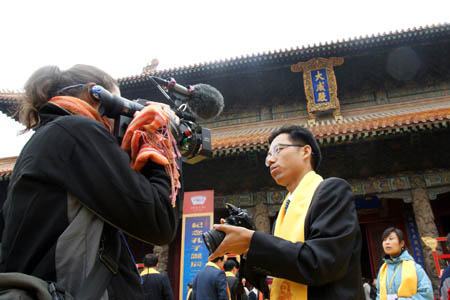Confucius commemorated on the 2559th birthday
JINAN/HANGZHOU, Sept. 28 -- Ceremony marking the 2559th birthday of Confucius, the great Chinese thinker and education master, was held in Jinan and Hangzhou on 28th. Sept.
"The movement of heaven is full of power. Thus the superior man makes himself strong and untiring." This is the classic doctrine of Confucius. It was being chanted and signed by forty deaf or mute children during the ceremony on Sunday in Quzhou, an city in east China's Zhejiang Province.
Quzhou is where one of the two family temples of Confucius locates. Twenty-eight generations of Confucius' descendants had lived there.
Participants at the ceremony did not wear traditional Chinese costumes as usual and rituals were simplified to show modern people's way of respecting the ancient sage.
Memorial activities were also held in Qufu, Shandong Province, where Confucius was born.
Jiang Daming, governor of Shandong, read an elegiac address at the ceremony, paying tribute to the man.
The address, compiled by Jin Yong, a well-known novelist of Chinese "wuxia" or martial arts stories, highlighted the Beijing Olympic Games and China's efforts to conquer a series of natural disasters as well as work protecting the environment.
The focus of the address varies every year, reflecting China's social evolution and the development of modern people's understanding of ancient ideologies, said Yang Zuoren, president of Shandong Confucius Business School.
Yang was the writer of the ceremonial address during the past four years.
Confucius (551 BC-479 BC) was a famous educator and thinker in ancient times. He founded Confucianism, a mainstream school of thought that deeply influenced later generations.
Confucius was a highlight of the dazzling opening ceremony of the Beijing Olympic Games on Aug. 8.
Performers dressed in ancient-style gowns chanted famous sayings of Confucius, such as "friends have come from afar, how happy we are" and "all those within the four seas can be considered as brothers."
The sayings indicated the significance and sustaining influence of the ancient sage in a modern society.
"Confucius is a pride and promoter of Chinese culture. Confucius institutes across the world are attracting more people who are interested in Chinese culture," said Maja Linneman with Germany-based Goethe Institute.
"We can not put Confucius aside when we talk about traditional Chinese culture. Not only China, but also the whole world should learn about Confucius thought, which has educational significance to a materialized society," said Roger T. Ames with the University of Hawaii.
 print
print  email
email  Favorite
Favorite  Transtlate
Transtlate JINAN/HANGZHOU, Sept. 28 -- Ceremony marking the 2559th birthday of Confucius, the great Chinese thinker and education master, was held in Jinan and Hangzhou on 28th. Sept.
"The movement of heaven is full of power. Thus the superior man makes himself strong and untiring." This is the classic doctrine of Confucius. It was being chanted and signed by forty deaf or mute children during the ceremony on Sunday in Quzhou, an city in east China's Zhejiang Province.
Quzhou is where one of the two family temples of Confucius locates. Twenty-eight generations of Confucius' descendants had lived there.
Participants at the ceremony did not wear traditional Chinese costumes as usual and rituals were simplified to show modern people's way of respecting the ancient sage.
Memorial activities were also held in Qufu, Shandong Province, where Confucius was born.
Jiang Daming, governor of Shandong, read an elegiac address at the ceremony, paying tribute to the man.
The address, compiled by Jin Yong, a well-known novelist of Chinese "wuxia" or martial arts stories, highlighted the Beijing Olympic Games and China's efforts to conquer a series of natural disasters as well as work protecting the environment.
The focus of the address varies every year, reflecting China's social evolution and the development of modern people's understanding of ancient ideologies, said Yang Zuoren, president of Shandong Confucius Business School.
Yang was the writer of the ceremonial address during the past four years.
Confucius (551 BC-479 BC) was a famous educator and thinker in ancient times. He founded Confucianism, a mainstream school of thought that deeply influenced later generations.
Confucius was a highlight of the dazzling opening ceremony of the Beijing Olympic Games on Aug. 8.
Performers dressed in ancient-style gowns chanted famous sayings of Confucius, such as "friends have come from afar, how happy we are" and "all those within the four seas can be considered as brothers."
The sayings indicated the significance and sustaining influence of the ancient sage in a modern society.
"Confucius is a pride and promoter of Chinese culture. Confucius institutes across the world are attracting more people who are interested in Chinese culture," said Maja Linneman with Germany-based Goethe Institute.
"We can not put Confucius aside when we talk about traditional Chinese culture. Not only China, but also the whole world should learn about Confucius thought, which has educational significance to a materialized society," said Roger T. Ames with the University of Hawaii.
Education News
 more
more- Confucius Institutes promote exchange between China
- New version of eye exercises for Chinese students
- Teaching "respectable" but "arduous" job in China
- China Anecdote: 13 years old graduate student in
- Overseas students focus on China as their destination
- China drafts 12-year guideline for education reform
- Chinese lawmaker engage to youngster education
- American Schools embrace Mandarin
Education Outlook
Top University In China: FUDAN
Initially known as "Fudan Public School", Fudan University
Top University In China: NJU
Nanjing University, one of China's key comprehensive
Top University In China: SJTU
Recommendation
Weifang University
Weifang University which is approved by the Ministry of Education as
Zhejiang University of Science and Technology (ZUST)
Zhejiang University of Science and Technology (ZUST) is a full-time
Xi'an University of Architec-ture and Technology
The university has been authorized by the State Council to set








